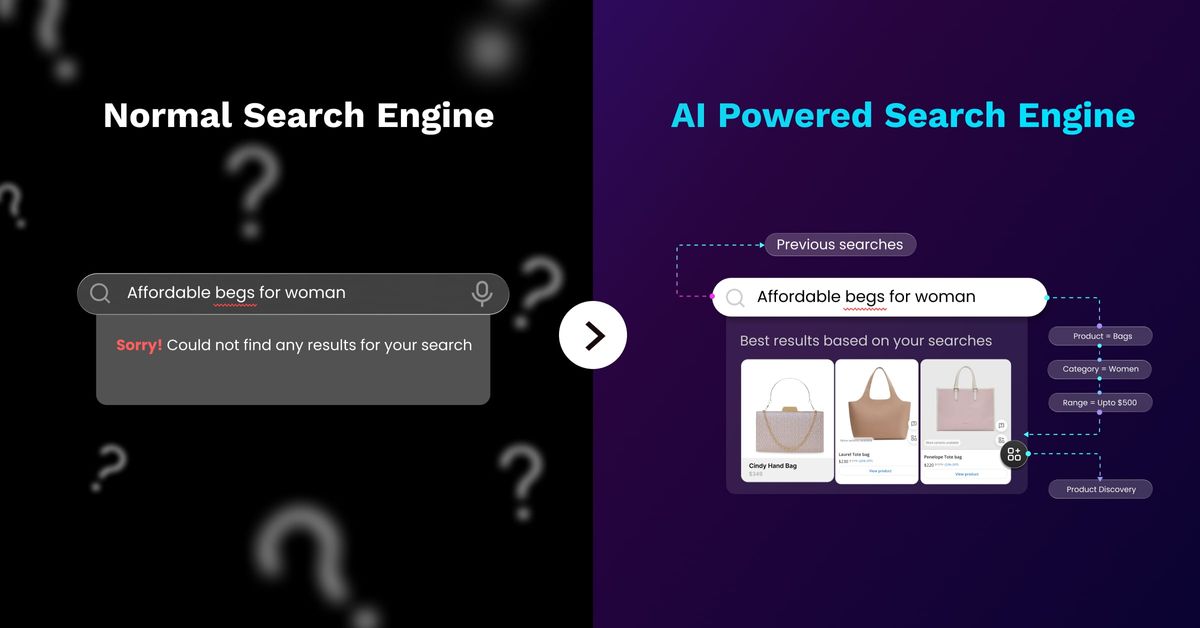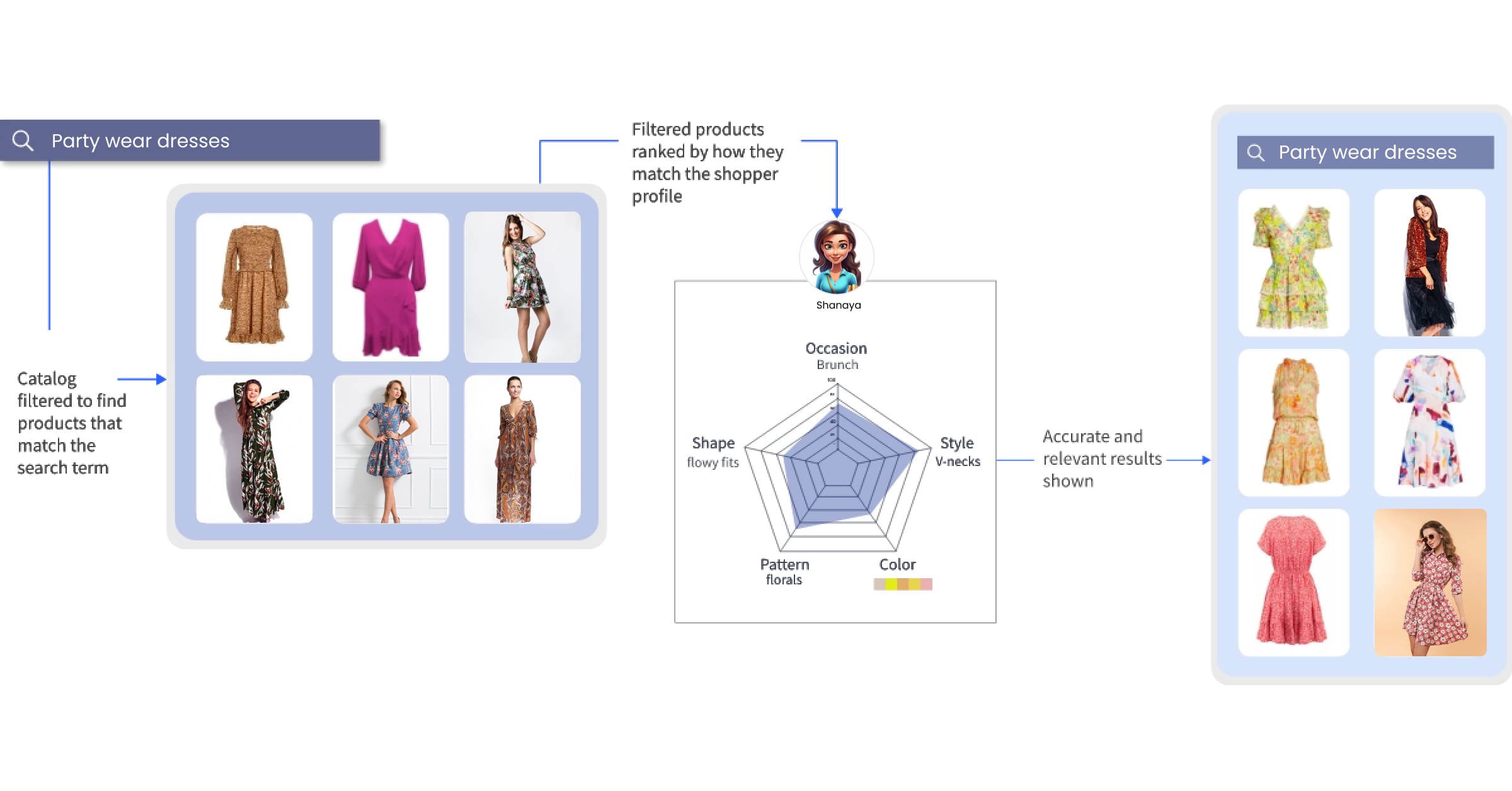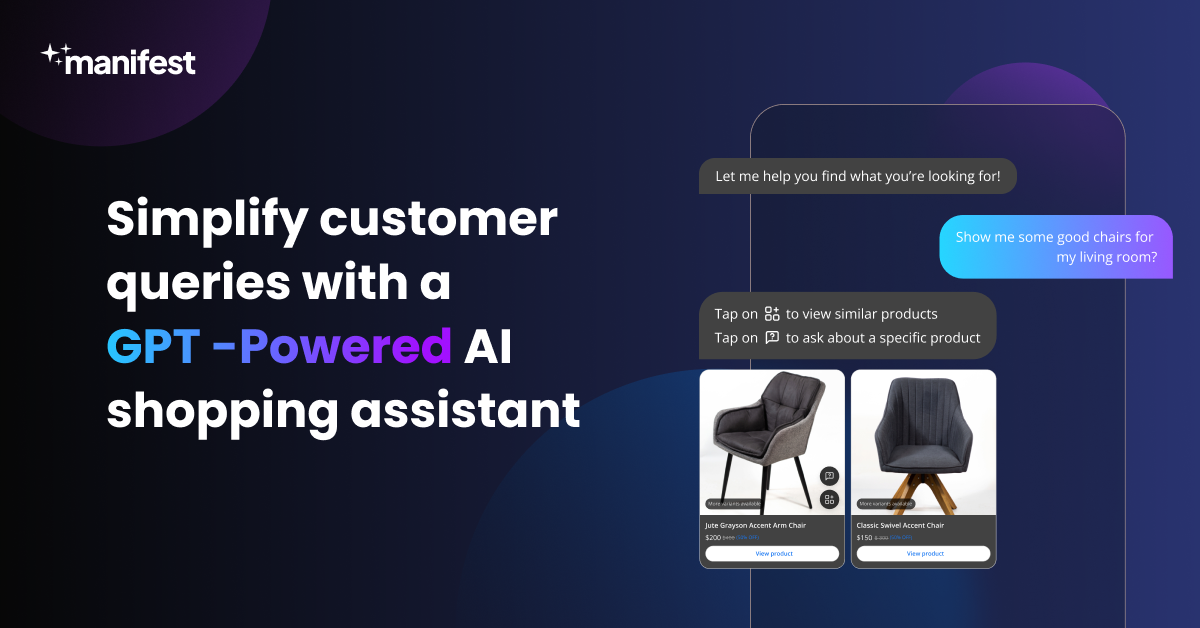How AI is Disrupting Ecommerce Search Engine?

Gone are the days when ecommerce search engines were limited by their ability to understand natural language queries. Thanks to AI, ecommerce search engines can now understand what you're looking for, even if you don't know the exact words to use. This means you're more likely to find the products you want, and you're more likely to buy them.
AI is also being used to personalize ecommerce search results. This means that you're more likely to see products that are relevant to your interests and needs. For example, if you've previously purchased a red dress, you're more likely to see other red dresses in your search results. AI can also be used to recommend products that are similar to the products that you've previously viewed or purchased.
In this blog, we’ll explore how disrupting ecommerce search engines by AI will become a boon for customers, let’s start with the evolution of ecommerce site search.
Evolution of e-commerce of site search
Before diving directly into AI and its impact on e-commerce search, let's have a quick recap of how the e-commerce search engine has developed over the years:
Keyword based ecommerce site search

Keyword search is the traditional method of searching for products on an ecommerce site. Shoppers enter keywords that they think are relevant to the product they are looking for, and the ecommerce site returns a list of products that match those keywords. Keyword search is still the most common method of searching for products on ecommerce sites, but it has some limitations. For example, it can be difficult to find products if you don't know the exact keywords to use.
Machine learning and artificial intelligence-based site search

Then came Machine Learning and Artificial Intelligence to elevate user interactions. Assume you're exploring an online fashion retailer's website, and are looking for a new dress for an upcoming occasion. Instead of relying solely on conventional keyword searches, the e-commerce platform now harnesses the capabilities of Machine Learning and AI to enrich the search experience.
Say you are going to attend an occasion in the evening, all you need to do is input "evening dress" into the search bar, and the AI-driven search functionality anticipates this query based on your past browsing and buying patterns. It takes into consideration your favored dress styles, sizes, colors, and even the latest fashion trends. Furthermore, there are several additional features facilitated by AI-driven ecommerce search engines, which we'll delve into in the upcoming section.
GPT based Ecommerce Search Engine- Manifest AI

The most recent and the future of ecommerce search engines is GPT-powered search. GPT-powered search engines are enhanced versions of existing AI-powered ecommerce site search that have a deeper grasp of context, allowing for more natural and coherent conversations. Not just that it enables a human-like touch to responses and online searches. Searches become as easy as talking to a salesperson at a physical store. Imagine typing a question like "Show me haircare products under $500" and receiving tailored product suggestions that precisely match your request. This enhanced understanding leads to a more intuitive and satisfying search process.
Deep dive into how AI in site search
In this section, we'll uncover how Artificial Intelligence is working its magic to supercharge search functionality, to give more intuitive and personalized user experiences.
Understanding Context and Intent
AI, empowered by advanced Natural Language Processing (NLP), possesses the remarkable ability to grasp the context, intent, and subtleties inherent in user queries. This sophisticated understanding empowers AI-powered ecommerce search engines to interpret queries much like how a human would. Take, for instance, the query "affordable laptops for gaming." It's no longer a mere sequence of words; instead, it serves as a gateway to a meticulously curated selection of laptops finely tuned for optimal gaming performance while adhering to specific budget considerations.
AI-Powered Personalised Product Recommendation
AI-powered ecommerce search engines enhance users’ shopping experience by analyzing their browsing history, purchases, and real-time actions. For example, imagine you're looking at running shoes; AI notices this and suggests related items like moisture-wicking socks or fitness trackers. This understanding helps AI offer recommendations that match what you like. As you explore, AI learns your preferences and suggests things you'll likely enjoy, creating a cycle of discovery and satisfaction. By using data and smart algorithms, AI changes how product recommendations work, making your online shopping journey more personal and engaging.
Visual Search
Visual search, a trailblazing feature empowered by AI, allows users to upload images or snapshots of products they desire. By analyzing these images and recognizing patterns, AI-driven ecommerce product search engines effortlessly guide users toward visually similar items, effectively bridging the gap between inspiration and discovery. Now, a fleeting moment of admiration for a unique handbag spotted on the street can seamlessly translate into an actionable shopping experience.
Improved customer experience and sales
Approximately 68% of shoppers would hesitate to revisit a website offering a subpar search encounter. With the AI-powered personalized search functionality, customers receive precise results, elevating both the overall customer experience and the likelihood of successful transactions. Consequently, this contributes positively to your business's financial performance.
Reduced customer support costs
AI-powered ecommerce site search tools also lower customer support costs by addressing product-related inquiries before customers need to reach out to support. This efficacy stems from the engines' capacity to comprehend customer search queries and furnish pertinent product details. As an illustration, an AI-powered search engine for ecommerce can supply customers with insights into product return policies or shipping expenses, alleviating the need for direct support interaction.
What to look for in an ecommerce search engine
It's clear that an AI-driven ecommerce search engine is crucial for every e-commerce store, but discovering the perfect solution can be a bit of a challenge. To assist you in this endeavor, we've assembled a concise checklist that you can refer to when assessing a tool for your store.
User Experience: Test the online store search engine's user interface from a customer's perspective. It should be intuitive, easy to use, and provide relevant suggestions.
Search Relevance: Look for a ecommerce search engine that can provide accurate and relevant results even with varying query formats, synonyms, and typos. AI-driven systems excel in understanding user intent.
Speed and Performance: A fast and responsive ecommerce search engine enhances user satisfaction. Look for one that offers quick search results, even as your product database expands.
Customization: Opt for an ecommerce site search solution that allows you to customize the search results layout to align with your branding and user preferences.
Integration: Check compatibility with your e-commerce platform (e.g., Shopify, Magento, WooCommerce). Integration should be easy, smooth, and well-documented.
Analytics and Insights: A robust ecommerce search engine will provide analytics and insights into user search behavior, helping you understand what customers are looking for and optimizing your offerings.
Scalability: Ensure the chosen ecommerce search engine can handle your current traffic and can scale as your business grows without compromising speed and performance.
Support and Maintenance: Choose a provider with reliable customer support and regular updates to ensure the ecommerce search engine remains up-to-date with evolving technology.
Best ecommerce search engine you should choose
The market is brimming with various ecommerce site search softwares, each presenting distinct offerings. Regardless of your store's size or budget, there's a fitting solution available. To simplify your search, we've handpicked some of the top e-commerce search services below:
Manifest AI

Manifest AI is a GPT 3.5 -powered e-commerce site search software that swiftly and accurately shows products best suited for customers’ needs. Manifest AI is an AI-powered chatbot for Shopify that comes up with a free plan.
Key features are:
- Contextual Conversations: Engages customers with contextual suggestions for questions and product recommendations, aligning products to their needs.
- Efficient Answers: Manifest AI provides quick answers to customer inquiries on products, shipping, and more, reducing support tickets and boosting satisfaction.
- Smart Recommendations: Using past history and browsing behavior, Manifest AI suggests products, promoting e-commerce product discovery and enhancing upselling and cross-selling.
- Analytics: Provides detailed analytics about how buyers are interacting with your store which can be used to improve your store's search functionality and make it easier for buyers to find what they're looking for.
In a nutshell, it is like an AI live chat for e-commerce stores.
Doofinder

Doofinder is an AI-powered smart site search tool that is predominantly used by SMBs and mid-market brands. Their offering includes a Free package that supports 1000 requests while their paid packages start at $35 per month which supports 10000 requests.
Key features are:
- Fast and Relevant Search: Their algorithms and indexing capabilities ensure that users find products swiftly.
- Search Autocomplete: The app offers predictive search suggestions as users type, helping them discover products more efficiently and reducing typing efforts.
- Smart Filters and Facets: Refines search results using smart filters and facets, making it easier to narrow down options based on various attributes such as price, category, brand, and more.
- Visual Search: Allows users to upload similar product images to help them hasten the product they are looking for.
Algolia

Algolia positions itself as an AI-driven e-commerce search solution tailored to enterprise-level stores. Their pricing model is based on the monthly count of search requests made.
Key features are:
- Natural language processing: Enabling users to search using words and phrases from live speech
- Geo-awareness: This enables users to view search results sorted by distance, or constrain their search to a particular region or radius.
- Multiple sorting strategies: Allows users to easily set up various sorting strategies, to help them select their preferred ranking.
Yext

Yext is an ecommerce search solution, whose main focus is natural language processing.
Key features are:
- Search Terms AI: Evaluates visitor search queries and identifies behavioral trends through intelligent analysis.
- User-Friendly Interface: Utilizes a seamless drag-and-drop platform for effortless visualization of modifications.
- Natural Language Processing: Enables searching conversationally, mirroring your natural language expressions.
Conclusion:
In essence, AI is revolutionizing ecommerce search engines by transcending mere keywords and transforming them into intelligent companions on our digital shopping journeys. With every search query, AI learns intent; with every interaction, it adapts; and with every click, it refines. The disruption is real, and as AI continues to evolve, the ecommerce search engine's role as a catalyst for seamless, personalized, and enchanting shopping experiences is set to flourish.
The future of online shopping is here and if you are looking to stay afloat in this era then it's time to empower your website with a Smart ecommerce search engine.

.png)
